

2022-03-19 | 2128 ![]() Print
Print ![]() PDF
PDF
Do you run a blog? Are you looking for how to rank blog posts? Then you are reading the right content, here! Because I will share with you the exact methods I use with how to rank my blog post on search engines like Google, Bing, Yahoo, DuckDuckGo, and Yandex. Ranking on Google seems to be the most difficult, but if you can get your content ranking on Bing and Yahoo then the rest will be easy, it takes a bit of extra push to get your page on Google with some solid link building.
The Blog SEO Tips are also applicable to how to rank WordPress blog on google and Blogger blog. The first mistake most bloggers commit is to write content or post that nobody is searching for on Google and assume a presumptuous search volume to the post without doing proper keyword research.

Before I start with the Blog SEO tips for ranking your blog content on Google, I will like to assume that you have actually done your keyword research on the topic you want to write on? if not then a quick detour on How To Do SEO Keyword Research and Keyword Difficulty Score Meaning will definitely come in handy, there is no rushing this if truly you are interested in getting results on how to rank a blog on Google's first page.
Your title tag is very important and will be the very first thing to look at, the title tag has to be an exact match with your long-tail keyword phrase. You have to consider what your focus keywords are from your keyword research and implement them in constructing your title tag, for instance, "How to Stop Spam Registration in PHP" is a long-tail keyword phrase with our focus keywords on "Spam Registration".
Common sense will dictate that I cannot instantly rank for such a competitive keyword, so what best way can I actually get my blog content to rank on Google? I need to dilute the keyword for a more broad keyword search phrase, most bloggers are familiar with the "How To" search volume so instinctively I have a good matchup combining "How To" and "Spam Registration" all I need is some sort of a conjunction verb, adverb or adjective to make a full sentence and what I came up with was "How To Stop Spam Registration".
Lastly, I will advise on the length of your title tag, try and make it a maximum of 8 words, just keep it within this word length, if you run a WordPress blog then you will understand the impact of these simple blog SEO tips as we move on tot he next tip.
As a blogger running a WordPress blog post or any other blog content platform you will understand that the sentence you make use of as your title is actually used as your blog URL, so if you take into effect the first blog SEO tip we just talked about you should have an exact match domain URL, you can consider removing stop words to optimize your Blog SEO URL you can read on this via How To Use Google SEO Stop Words List.
One of the benefits of this technique is that it will enhance your Exact Match Keywords Ranking (SEO), which is the first step in getting to rank for loose-based keywords on search engines like Bing, Yahoo, Yandex, and DuckDuckGo. I strongly recommend a read-up on this topic as it will reinforce your understanding of how to implement exact match keywords ranking.
The use of heading tags is already considered a big factor in search optimization, and it can assist you to rank your blog content when used properly in a blog post, they are located in the body of your blog content. Most bloggers implement their Heading tags wrongly by not arranging them in order, you need to use the h1 tag once and it should be used to represent the title of your blog content and should be used only once. In the h1 topic, make sure it contains either the exact match keyword phrase with your URL extension or the Title of the post.
The next heading tag should be your h2 which should be used less or once as well, you implement it as your subheading in your blog post content, and then make use of h3 for your appendix subheadings to explain or define your subheading categories. eg similar to our illustration, we have an h1 as our heading and h2 for subheading after the image, and the listed subheadings under "Blog SEO Tips for ranking your blog content" are in h3 head tags. When doing this you need to make sure they are in such order, from h1 to h5 (if you need any further use of the lesser heading tags).
4.) Description Tag:
Personally, this doesn't carry much weight as it use to, but we will be making references to it, as some search engines still utilize it. Most popular search engines do utilize a match copy of search queries entered in searches and bind them to your content if they cannot find matching words in your description tags. So if Google or search engines cannot find a match-up for the searched keyword they will prefer to match it with the content on the page, thus providing an alternative meta description for the end-user. A quick recommendation will be for you to utilize the first paragraph of your body content in your meta description, and keep it short within 150 characters, to be more creative I will advise you to add the "read more" just to have the user click when they go through your web site description this will increase click-through rates and as well more display of your description meta tag if you follow my tips as described.
By now you should have known your focus keywords and find a way to implement them successfully without making it look like keyword stuffing, make sure you have your focus keyword in your first paragraph as it is in your title, which will make it part of your URL and include it in your body tile as well.
The major idea is to have the keyword to be located above the fold section of your blog post, this will allow the search engine to quickly pick up on what the content is all about before it crawls deeper. Your keyword position is quite vital and your arrangement will determine how important your focus keywords are to the content itself.
This is a topic I find very interesting because it is on a dwindling edge of how quality your content is, to begin with, as much as I like to admit it, personally I feel writing long well detailed content can actually get you ranking better than writing 500 words count, and in contrast to that with a high-quality long content post your blog can actually rank for more related keyword phrases as well. And furthermore from experience having a long blog content post helps to saturate your keyword density most times and allows you to avoid some silly search engines penalties that can arise from Bad Outdated SEO Practices and Tactics.
Most bloggers don't understand the use of images to optimize their blog SEO, and in this regard, I will like to touch on a simple fact that, having too many images on a single page is seriously doing you more harm with respect to the size of these images and also it is best you optimize your image by using compression version and cached version of your images.
Always include your image size and always include a description in your alt tag, with this tag you could include your other recommendation search for keyword phrases and likewise add an img-responsive class if you are using a bootstrap CSS.
The emphasis tags are tags that add an extra value of relevance to a text they are being used on, similar to the headline tags, they are used mainly to highlight the importance of a focus keyword, and are very useful in SEO and classified as a minor Blog SEO factor, but when used right in creating content, you can rank perfectly well for the exact match keyword, examples of emphasis tags are as follows; em, bold, strong, blockquote, pre, code, ul (ol,li), i, cite, mark, and dfn.
I am really making a lot of strong statements surrounding keywords, and the proper use of your keywords is all the difference you will need. LSI (Latent Semantic Indexing) keywords are words that are related to the main keyword and are seen as semantically relevant. If your page's primary keyword is 'credit cards,' then LSI keywords would be things like “money,” “credit score,” “credit limit,” or “interest rate.” If you can master the use of this technique in content writing you will easily find your rank-up blog will start ranking for other related search queries as well.
Most bloggers don't utilize this tag since it has been rendered useless, but I still make use of it due to the fact that other search engines still utilize it and for bloggers, your keyword tags are as good as your tags used in WordPress, back then if a blogger was looking for how to rank wordpress blog on Google, all they had to do was to include keyword tags and stuff it with their focus keywords among other keywords ranking abuse (grey hat SEO). But today we have the tags for blog posts that can work in a similar way to your keyword tags. For instance, our blog post tags are used as keyword tags that are relevant for our social media tags, so it is still better to utilize them but not to abuse the use.
These are the exact 10 steps I use to rank blog posts and I believe if you master them you can use the same technique To Rank Blogger blog, and WordPress blog post on Google's first page. Below is further proof of my attestation of this Blog SEO Tips used to rank "How to stop spam registration in PHP" on Google, Bing, Yahoo, Yandex, and DuckDuckGo search engines.
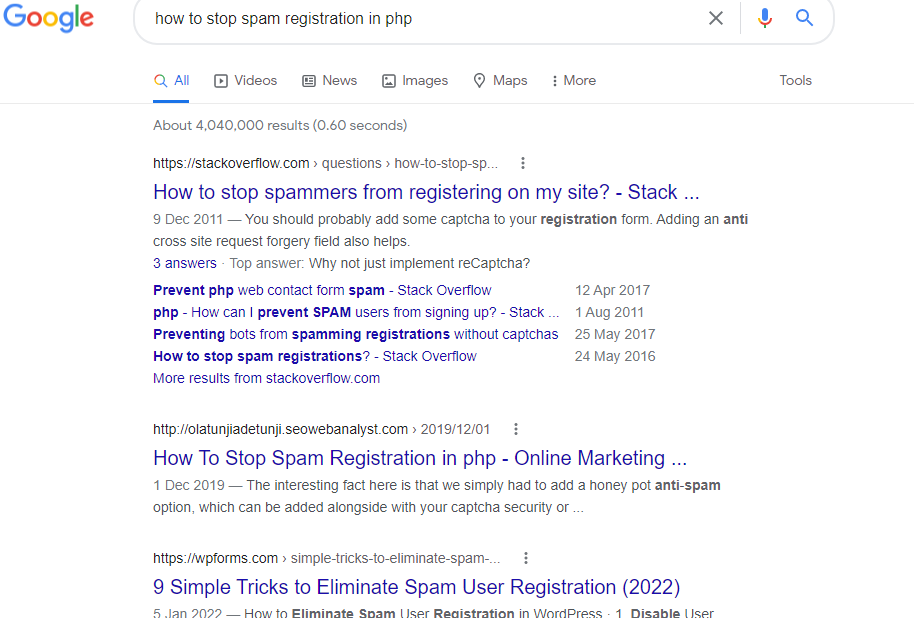
Google search results for search phrase "How to stop spam registration in PHP"
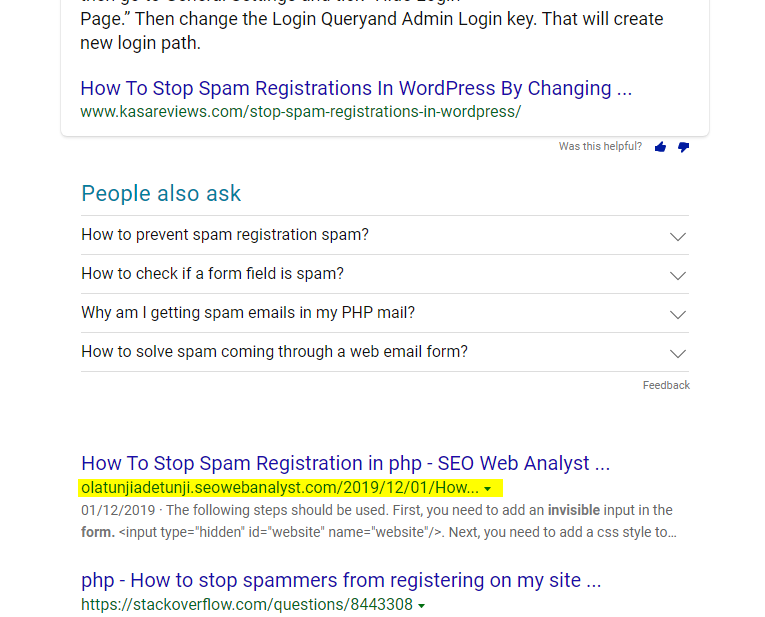
Bing search results for search phrase "How to stop spam registration in PHP"
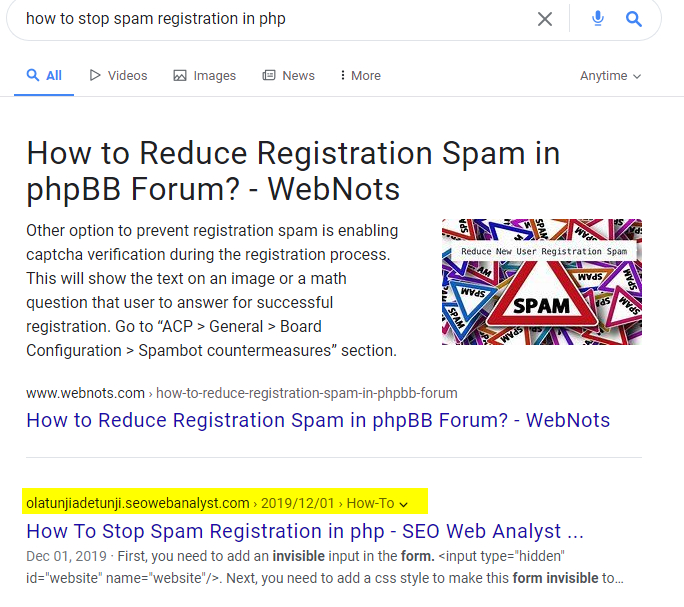
Yahoo search results for search phrase "How to stop spam registration in PHP"
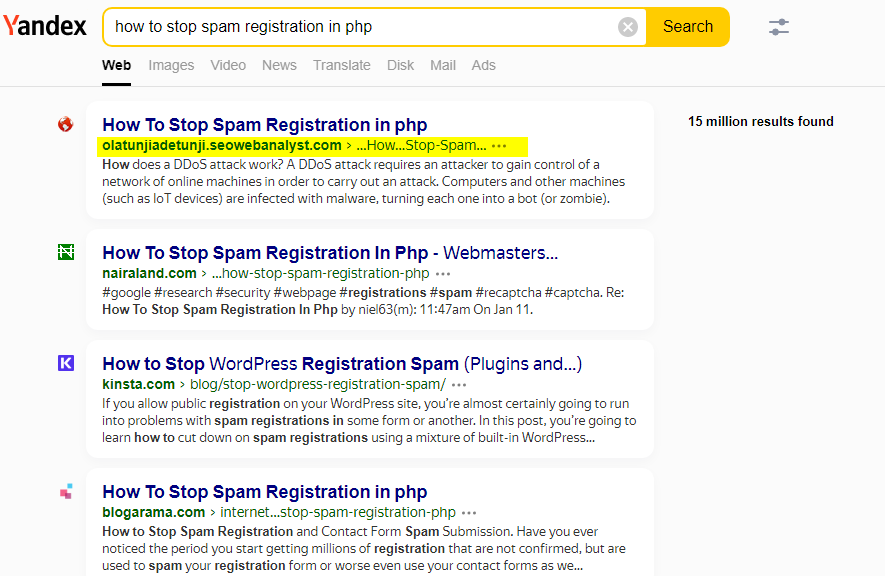
Yandex search results for search phrase "How to stop spam registration in PHP"
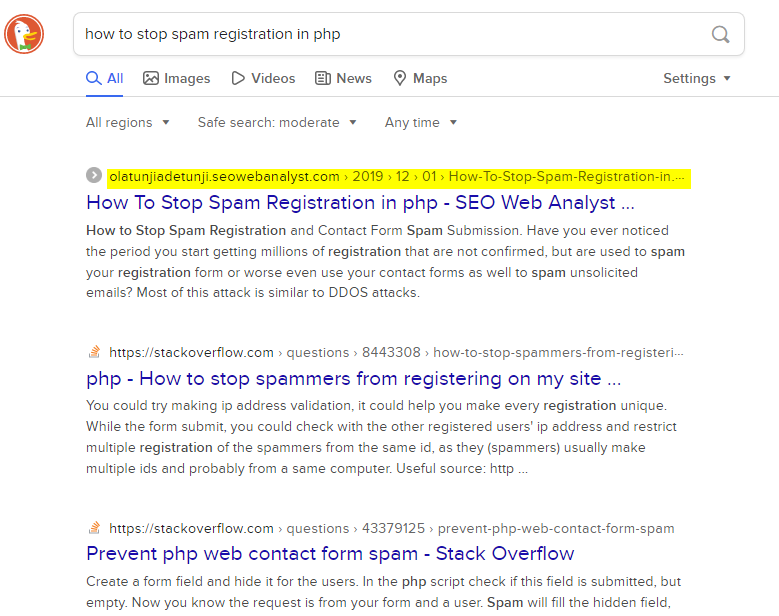
DuckDuckGo search results for search phrase "How to stop spam registration in PHP"
What do these search engines have in common with Google first page results? Yep! I am ranking on their first page likewise, now this is something that comes in not on a frequent note, but on several occasions, you can actually have a unification of all search engines ranking your blog post on their first page.
Conclusively I will like to state that it is also a good thing if you can get your blog content ranking on these search engines based on exact keyword matching as it shows the quality of your content prior to you further optimizing your content SEO by building authoritative backlinks, so don't just sit tight on ranking on Google but also work around ranking on other top search engines as well to increase your visibility, gain from the power of searches from other search engines if ranking on Google is looking unattainable.
Attention: You should submit your new blog post for indexing by search engines as soon as you are done sharing it and syndicating on social media sites and executing any other form of traffic generation to the blog post.
Recommended Read: List of Top 12 Best Search Engines in the world
Interested in finding a blogging tool that actually perfect your content writing skills and help you to rank on search engines like Google, Bing, Yahoo, Yandex and DuckDuckGo etc. Then look no further because that's the main purpose I built the blog curator tool, still in it's development stage but hopefully I will have it all good to go before the 3rd quarter of the year. I can't wait to see what ranking Blog Post content you can create with the tool.

I am a seo web analyst and have a love for anything online marketing. Have been able to perform researches using the built up internet marketing tool; seo web analyst as a case study and will be using the web marketing tool (platform).
How To Fix GA4 Showing Wrong Domain Traffic
How To Reactivate Google Adsense Account
How Do You Write Pitch Deck That Wins Investors
Effective Lead Magnet Funnel Examples For Businesses
How To Promote FMCG Products Using Digital Marketing
The Main Objectives Of SEO in Digital Marketing
How Artificial Intelligence Is Transforming Digital Marketing
Google CEO Sundar Pichai: Search will profoundly change in 2025
3 Most Important Business Growth Strategies
Top 20 Work From Home Job Skills